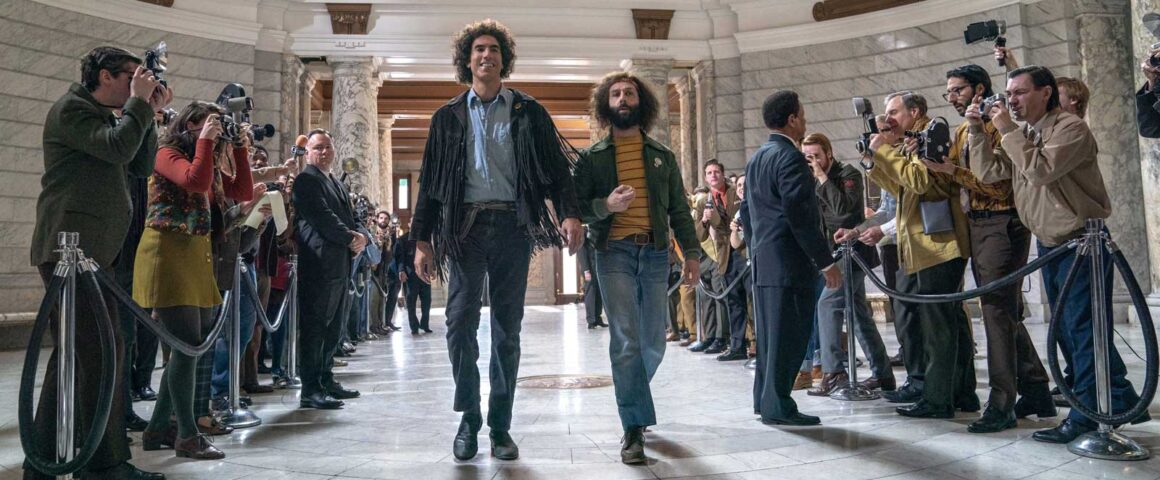The Democratic National Convention met in Chicago in August 1968 to choose their presidential candidate in a tumultuous year that saw the assassinations of Martin Luther King and Robert Kennedy, the passage of the Civil Rights Act, Prague Spring, and growing protests in cities around the world against the escalation of the Vietnam War. Although some culture warriors came to Chicago to perform “political theater,” it was the anti-war sentiment that brought thousands of young people to Chicago where “the whole world was watching.” Written and directed by Aaron Sorkin (“Molly’s Game”), The Trial of the Chicago 7 dramatizes the subsequent trial of eight defendants (Bobby Seale’s case was later separated) charged by acting Attorney General John Mitchell (John Doman, “You Were Never Really Here”) with crossing state lines to incite a riot, the so-called Rap Brown Law.
Denied a permit to camp in Grant Park, the protests turned ugly after the brutal beating of anti-war activist Rennie Davis (Alex Sharp, “The Hustle”) at the hands of the Chicago Police Department, a beating that landed him in the hospital with a concussion. When activist Tom Hayden and other demonstrators stood up for Davis, Mayor Richard Daley’s massive assembly of police as well as the Illinois National Guard began indiscriminately beating up protestors. By the end of the week there were 668 arrests, 400 requiring first aid, and 110 were taken to a hospital. It was a scene that Connecticut Senator Abraham Ribicoff memorably described on the floor of the convention as “Gestapo tactics in the streets of Chicago.”
Though some of the police presence was a reaction to the provocative threats of the Youth International Party (Yippies) led by Abbie Hoffman (Sacha Baron Cohen, “Alice Through the Looking Glass”) and Jerry Rubin (Jeremy Strong, “The Big Short”), it was clear that Mayor Daley, one of the last of the big-city bosses, was determined to challenge any threats to his personal domain. The film jumps right into the trial without providing much background except for some pictures of the Vietnam draft, speeches by Robert Kennedy and Martin Luther King and, in a more lighthearted vein, protest organizers discussing what boisterous fun they are planning in Chicago.
While some of the incidents in the trial are rearranged for dramatic value and some are invented, Sorkin basically follows the court transcripts though there is enough deviation from actual events to make his script, as he described it, “more like a painting than a photograph.” In addition to Hoffman and Rubin, the strong ensemble cast includes peace activists Tom Hayden (Eddie Redmayne, “Fantastic Beasts: The Crimes of Grindelwald”), Rennie Davis (Sharp), David Dellinger (John Carroll Lynch, “The Founder”), John Froines (Daniel Flaherty , “The Meyerowitz Stories”), and Lee Weiner (Noah Robbins, “The Assistant”).
Frank Langella (“Captain Fantastic”) portrays Judge Julius Hoffman, 33-year old lead prosecutor Richard Schultz is played by Joseph Gordon-Levitt (“Snowden”), and Mark Rylance (“Ready Player One”) is defense counsel William Kunstler. In a standout performance, Michael Keaton, (“Spiderman: Homecoming”) as former Attorney General Ramsey Clark, delivers a testimony for the defense which unfortunately was stricken from the record. Baron-Cohen’s Hoffman is perhaps the most authentic of the characters, but the others are little more than caricatures with Seale, Hampton, and Rubin coming off the worst.
In the trial, Sorkin tries to balance the outlandish behavior of Hoffman and Rubin (once dressed in judges robes), the drama of Bobby Seale (Yahya Abdul-Mateen II, “Us”) being bound and gagged in the courtroom protesting the murder of Black Panther leader Fred Hampton (Kelvin Harrison Jr., “Luce”), and the overbearing incompetence of the Judge who acts with malice towards the defendants, dismissing objections from the defense before they were made and arbitrarily excluding evidence, witnesses, and even jurors.
Tom Hayden (who later became a California State Assemblyman) is shown as the responsible one in contrast with the Yippies. In a verbal skirmish, when Hoffman asks Hayden what his problem with him is, he replies, “My problem is for the next 50 years, when people think of progressive politics, they’re gonna think of you. They’re gonna think of you and your idiot followers passing out daisies to soldiers and trying to levitate the Pentagon. They’re not going to think of equality or justice. They’re not going to think of education or poverty or progress. They’re gonna think of a bunch of stoned, lost, disrespectful, foulmouthed, lawless losers, and so we’ll lose elections.”
While all the elements are present in The Trial of the Chicago 7 for an impactful experience: Dramatic events, snappy dialogue, comic relief, and some raw and powerful moments, the film often feels verbose and inorganic, perilously close to a TV movie of the week. While the debate between Hoffman and Hayden is illuminating and relevant, what the film misses is a feel for the culture of the sixties or an overriding understanding of what is at stake. We witness a group of young people shouting, running, and being beaten, but the film does not capture the reason that brought them to Chicago in the first place. We hear no arguments for or against a war that had dragged on for four years and had stained the soul and character of the nation.
Sorkin further ignores the sense of desperation the demonstrators felt, knowing that the Democrats were about to nominate a candidate who, like Johnson, had rejected North Vietnam’s overtures to come to the peace table in exchange for a bombing halt. The only time we get a sense of what it was all about is when Tom Hayden begins to read aloud in court the names of the thousands of soldiers who had died, many still in their teens. It is in the moment when we learn that those who died in the war had names that The Trial of the Chicago 7 finally comes alive and tells us what the peace movement stood for.




'Movie Review: The Trial of the Chicago 7 (2020)' has no comments